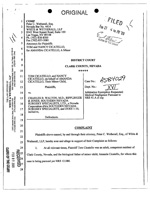Saturday, June 1, 2013 | 2 a.m.
Do No Harm: Hospital Care in Las Vegas, Part 4
- Why we suffer
- Flesh wound was so much more
- After sugery, an injury uncured
- Missouri family loses its rock
- Leaving hospital saved her life
- Where I Stand: Hospitals should examine what ails them, seek cure
- Overview of the Sun’s series on health care
- How to file a complaint
- Why Nevada’s nurses quit
Share your stories
Sun coverage
Sunday Discussion: Hospital Infections
After a Sun investigation found lethal "superbugs" are infecting thousands of patients in local hospitals, four people with distinct perspectives on these hospital-acquired infections gathered to discuss the dangers posed by the bacteria and obstacles to fighting their spread.
A national study involving six Florida hospitals could answer a heated medical debate over how best to protect patients from the dangerous MRSA super bug.
Screening patients for MRSA and isolating those who have it is the most common strategy used at hospitals. But it isn’t the most effective approach, researchers found in the study published recently in the New England Journal of Medicine.
Many more infections were prevented when the hospitals treated all intensive care patients — regardless of whether they had the MRSA bug — with an antimicrobial bath and nasal ointment.
This approach was tested at Largo Medical Center, one of the local institutions involved in the study through parent company Hospital Corporation of America, the nation’s largest for-profit hospital chain.
The study involved 43 hospitals and nearly 75,000 ICU patients.
The results could be a game-changer in how hospitals combat MRSA, or methicillin-resistant Staphylococcus aureus, a type of staph bacteria that is not easily treated with antibiotics.
It’s fairly harmless on the skin, but the bacteria can become deadly after entering the bloodstream.
Hospital patients with open wounds and intravenous lines are especially vulnerable to severe infections, which have been blamed for as many as 19,000 U.S. deaths annually. More recent statistics from the U.S. Centers for Disease Control and Prevention, however, indicate MRSA infections are declining, especially in hospital settings.
But it remains such a scourge that HCA plans to roll out the most effective treatment identified in the study as standard practice in the adult ICUs of its 156 hospitals nationally, including 38 in Florida.
Researchers hope others will follow.
“I think it’s going to be a lively discussion,” said Dr. Doug Holt, director of infectious disease for the University of South Florida’s medical school. “There will be a lot of pressure because people sort of feel isolation fatigue.”
Holt, who was not involved in the study, said most hospitals isolate ICU patients if they are found to have MRSA. They are placed in private rooms, with visitors and health care workers required to don gloves and gowns to enter. The idea is to limit the spread of the bacteria, typically found in the nose.
But the researchers found that these type of contact precautions, coupled with screening to identify MRSA carriers, aren’t the best approach for preventing ICU infections, even though they are mandated in nine states.
In the study, hospitals were randomly assigned to three prevention strategies — screening and isolation; screening and isolation with MRSA treatment for the patient; and across-the-board treatment for all ICU patients.
Treatment involved a daily bath with an antiseptic towel — which comes prepackaged and is slightly larger than a wash cloth — for five days. During that time, patients also received a nasal ointment medication twice a day.
In the group receiving universal treatment, researchers reported a 37 percent decrease in positive MRSA cultures.
They also saw a 44 percent decrease in all bloodstream infections, not just those resulting from MRSA.
“We’ve hopefully answered this critical question of whether we go after each super bug one by one by one and protect high-risk people,” said Dr. Susan Huang, an associate professor at University of California-Irvine medical school, the study’s lead author. “We can treat them all and protect them all.”
Because the study took place in community-based hospitals, as opposed to uniquely specialized and staffed academic institutions, she said, the practices identified easily could be implemented in hospitals nationally.
A study on the cost effectiveness is in the works, Huang said. But she estimated that the antiseptic towels would cost hospitals an extra $3 to $5 per day. The nasal treatment would run $3 to $35 dollars per course, depending on whether generics are used. And hospitals could eliminate the expense of screening their ICU patients for MRSA.
But the study did not address concerns, noted in an accompanying editorial in the New England Journal of Medicine, that widespread treatment could lead to more patients developing resistance to these drugs.
“It’s like giving somebody antibiotics when they have a virus. It’s overuse of antibiotics,” said Holt, who is also the director of the Hillsborough County Health Department, noting that the result could be an even harder-to-treat super bug. “You don’t want to lose another bullet in your chamber because you overdid it.”
He preferred to look first at the widespread use of the antiseptic wipes.




Join the Discussion:
Check this out for a full explanation of our conversion to the LiveFyre commenting system and instructions on how to sign up for an account.
Full comments policy